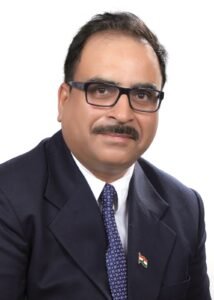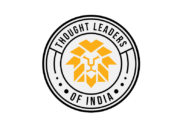Prakash Tewari
Col Prakash Tewari (Retd) was the Director Policy (Ecology) in the Integrated HQ of Ministry of Defence, Executive Director Gurgaon Rejuvenation of DLF Ltd, Executive Vice President, Sustainability and Education of Jindal Steel and Power Ltd and Head CR (Community Relations) and R & R (Resettlement and Rehabilitation) of Tata Power Company Ltd. These Corporates are integrated Private Companies in Infrastructure, Steel, Power, Real Estate, Renewable and Clean Energy Development with footprints in Asia, Africa, Middle East and Australia. He was responsible for mitigating the environmental and social risks in large Infrastructure Development Projects in these continents. These Projects were joint foreign ventures / special purpose vehicle set up in collaboration with National Governments, International Funding Agencies like World Bank (IFC), Asian Development Bank (ADB), Paribas Bank etc and hence required close coordination/integration with all stakeholders. He is Presently Chairman of Tewari Group and has recently published his work book, ‘Bunker to Bliss’.

Our Exclusive Interview:
1. What does Leadership mean to you?
Leader should be result oriented by use of Ethical means, Coming from Armed Forces background and joining the NDA at the age of 15 years Leadership for me is leading from the front, taking responsibility for all failures and attributing success to all subordinates. A Leader is like a eagle who loves storms and get excited when clouds gather as it uses the storms winds to fly higher. They also have accurate vision and can see till 5 kms. No matter what obstacle, it will not move his focus from prey till he grabs it.
2. How do you delegate responsibility? What is your mantra for making your team accountable?
I follow a consultative process and first draw an outline plan with the team. Thereafter do the detailed planning with my core group and break the plan into small segments with clear cut aim, deliverables, outcomes, timelines with indices for measuring the efficiency and effectiveness. After allocating resources the execution and implementation is left to the team. I only monitor and step in when required. Since served in process driven Armed Forces, MNCs and Tata Group, have been trained in Tata Business Excellence Model and Corporate Enterprise Process Management Systems and hence combine the best practices of all Organisations. It is important to know your team understand their ability, assign their responsibilities accordingly.
3. How would you describe your leadership style?
I have a democratic leadership style and believe in coaching, mentoring and transforming. I care about my people as also the job. I feel that people give their best if they have trust and faith and know you will take care of them always. it is important to have a personality where in you accept mistakes and give a chance to grow.
4. What is that key factor that is needed in building great leaders in India Inc.? Do you think any intervention is required in the process?
The key factor for building great leaders in India is placing the Nation, Organisation and Employees interest above self. Why is that the Armed Forces as compared to Corporates have extremely high level of motivation, dedication and honour and are ready to lay down their lives for the goals and purpose of the Organisation. The key constituent of military ethics is the concept of unlimited liability. Members of the military accept that they can be lawfully ordered to go into conditions which could lead to their death. This unique provision sets them apart from any other profession, and is at the heart of understanding the meaning of duty. Great leaders in military have less exposure to corporate world there is a need to integrate the two systems.
I feel the same can happen if Corporate Leadership is fortified through spirituality by a firm commitment and belief in self and a higher purpose of life.
5. Do you admire any leader? If yes, who? How has he/she influenced your life?
I admire Mr Rattan Tata as I was with the Group when 26/11 took place. He not only motivated us but went out of his way and not lose hope in face of adversity. He not only took care of his employees who lost their lives but also all people of Mumbai who lost their lives and all brave hearts. This is what Corporate Leadership is, fortified through spirituality by a firm commitment and belief in self and higher purpose of life.
6. What matters to you the most – loyalty of your employees or loyalty to your customers/ clients?
Loyalty is something which cannot be segmented. Loyalty to the Organisation ensures loyalty to employees as also loyalty to customers/clients.
6. How does competition affect your strategies towards your organisation – for productivity, for turnover, for employees?
Competition keeps leaders on their toes to innovate and transform. Organisation have to keep evolving and innovating with changing time. Competition helps in evolution so as to live life intensely and compete with self. I feel it also helps to motivate employees for better results.
6. How important is intellectual exchange for you? How do you seek it, and where?
It is very important as keeps one rejuvenated for spiritual and intellectual upliftment. I am member of FICCI, CII, ASSOCHAM, PHD Chambers of Commerce etc and take part in their events as a speaker/panellist/audience. Besides this frequently network with Leaders of Business, Academia, Government and Embassies through formal and informal interactions.
Know the Person
- Money to you is essential.
- Your favourite film is Bridges of Madison County.
- Your favourite food is Indian cuisine.
- Your favourite film star (male) is Tom Hanks.
- Your favourite film star (female) is Jennifer Aniston.
- Your favourite holiday destination is Lucerne, Switzerland.
- Friendship to you is communication in silence.
- The person you admire the most is self.
- Your dream is to be a Santa Claus.
- Your best-kept secret is no secret.
